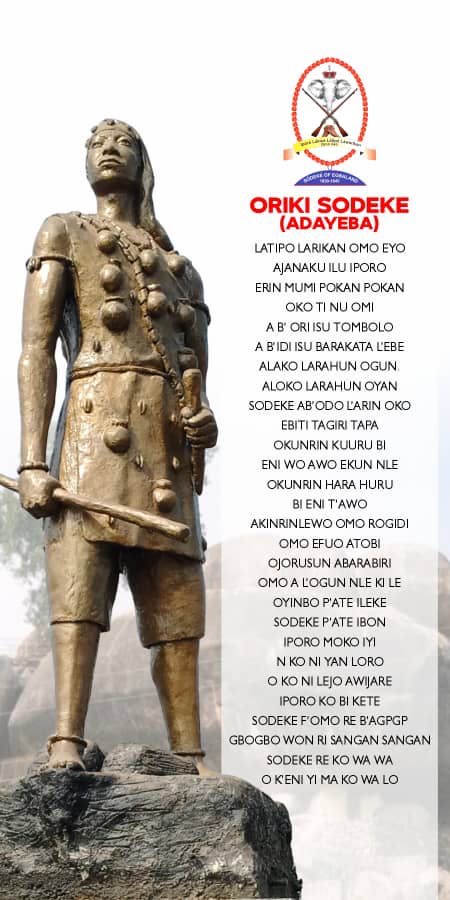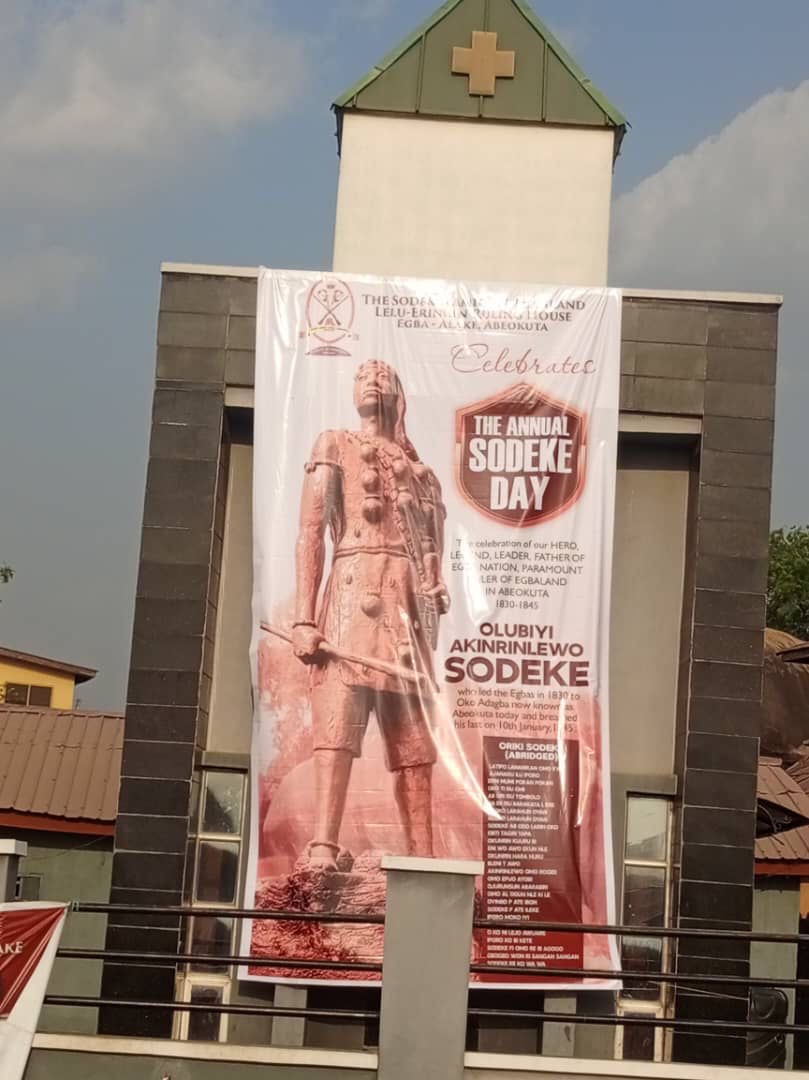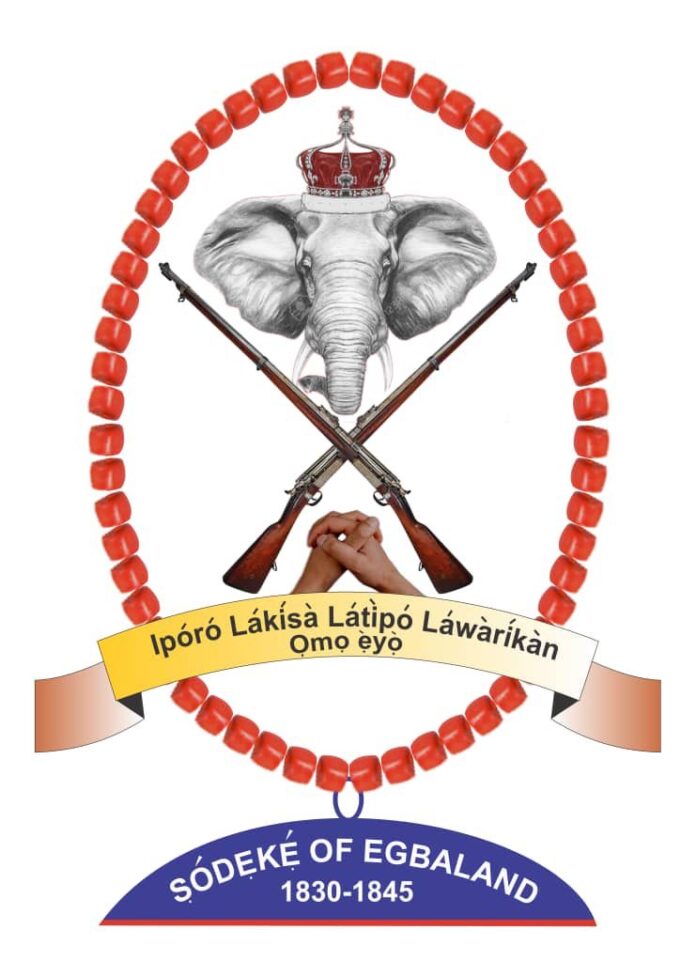Celebrating the Enduring Impact of a True Egba Hero, Sodeke, and the Illustrious Sodeke Dynasty that Shaped the Course of History Across Pre-Colonial, Colonial, and Post-Colonial Eras.
The 180th Sodeke Day, commemorating the renowned Egba hero is not only a celebration of personal accomplishments but a testament to the cultural and historical narrative of the Egba people. It is an occasion that encapsulates the resilience and fortitude of the Egba Empire through precolonial, colonial, and post-colonial epochs.
The significance of the day lies not only in the legacy of its namesake, Sodeke but also in the enduring influence of the families that shaped the socio-political landscape of the Egba region of Nigeria. In exploring these themes, it becomes clear that the story of Sodeke transcends the individual, flowing into the rich, intricate tapestry of Egba’s history and identity.

Sodeke, regarded as the founder of Abeokuta, is a pivotal figure in the history of the Egba people. His leadership during the consolidation of the Egba in the early 19th century was crucial as they sought refuge from the devastation wrought by the Fulani jihad and the transatlantic slave trade. The Egbapractised agriculture and established a fortified settlement that became Abeokuta, which translates to “under the rock”. This geographical advantage not only provided protection but also fostered a sense of community and belonging among the Egba.
In addition to military strategy, Sodeke demonstrated remarkable political acumen. His ability to unite various clans under a single banner was not an easy feat. The Egba were fragmented, with different clans often at odds with one another. Sodeke’s vision of a unified Egba nation provided a context in which the people could establish their cultural identity while simultaneously resisting external threats. This period marks an essential transition from a fragmented society to a cooperative community seeking to protect its cultural heritage.
The colonial period added layers of complexity to Egba’s history. Sodeke’s successors faced the encroachment of the British colonialists, who sought to impose their power over the newly structured and fortified community in the early 20th century. While Sodeke laid the foundational ethos of unity and resilience, this spirit was tested as the Egbaconfronted the challenges of colonial rule. The British sought to dismantle the local governance structures and impose their administration, sparking both resistance and adaptation among the Egba.

The emergence of resistance movements during this time can be attributed to Sodeke’s legacy. Communities that had been forged through his leadership nurtured a spirit of defiance. The Egbaelite played pivotal roles in the anti-colonial struggle, with many adopting the strategies of negotiation and diplomacy that Sodeke himself had employed when dealing with external powers. The “Abeokuta Women’s Revolt” of 1947 serves as an illustration of this spirit. Women from the region protested the local taxes imposed by the colonial government, reflecting their agency and their solidarity—themes deeply embedded in Sodeke’s vision for a cohesive society.
As Nigeria gained independence in 1960, the influence of figures such as Sodeke remained integral to the cultural and political identity of the Egba. The period of post-colonialism, marked by various political upheavals, necessitated a return to the foundational values established during Sodeke’s time. The principles of unity, resilience, and community-driven politics became a rallying point for the Egba people amidst the challenges of nation-building.
However, the post-colonial landscape was fraught with its challenges including ethnic tensions, political instability, and economic distress. The Sodeke Day celebrations serve not only as a reminder of this historic legacy but also as a means of rekindling the spirit of solidarity that characterised the earlier struggles of the Egbapeople. This annual event plays a crucial role in reconnecting the younger generations with their heritage, thus preserving the memory of Sodeke and the values he embodied in the face of adversity.
The name Sodeke transcends his role as a historical figure; it resonates deeply within the cultural consciousness of the Egba people. His family has remained a notable elite family within the region, bearing a legacy that continues to impact contemporary society. The commitment to education, cultural preservation, and community development evident among the Sodekes is reflective of their ancestor’s vision. This continuity fosters a sense of pride and responsibility among the descendants to uphold the values instilled by Sodeke.
The Sodeke family’s contributions to education, religion, and politics are emblematic of the way elite families can shape societal trajectories. In contemporary Nigeria, where socioeconomic stratification remains a challenge, families like that of Sodeke serve as beacons of hope and motivation. They embody not just the history of their people but also inspire future generations to contribute positively to their communities.
The celebration of the 180th Sodeke Day is therefore not just a remembrance of a single individual’s achievements but a multifaceted reflection on the triumphs and tribulations of the Egba people throughout history. From the precolonial consolidation of the Egba nation, through the challenges posed by colonial rule, to the post-colonial efforts to preserve cultural identity amidst modernity, Sodeke’s legacy remains a cornerstone upon which the Egba people build their present and future.
By commemorating this day, people not only honour a hero but also recognise the ongoing struggles and triumphs that continue to resonate through the years. In modern times, Sodeke Day can serve as a platform for discussions around historical memory, cultural identity, and the role of elite families in contemporary society. It emphasises the importance of unity, courage, and resilience—the hallmark traits of the people that Sodeke once led.
Lastly, the enduring legacy of Sodeke invites all Egba people to reflect on their historical narrative and continue the work of building a prosperous, united community. The 180th Sodeke Day thus stands as a true testament not only to an individual hero but also to the collective spirit of a people who have navigated the complexities of history while remaining anchored to their cultural identity.








